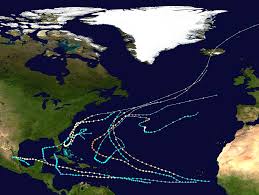Understanding Atlantic Hurricanes: Trends and Impact

Importance of Atlantic Hurricanes
Atlantic hurricanes are powerful storm systems that form over the warm waters of the Atlantic Ocean and can have devastating impacts on coastal communities and ecosystems. Understanding their patterns, recent trends, and potential impacts is crucial for disaster preparedness and climate change adaptability, especially as these storms can lead to severe weather events, property damage, and loss of life.
Current Trends in Atlantic Hurricanes
The 2023 hurricane season has already shown some significant trends that are noteworthy. While the season typically runs from June 1 to November 30, early activity has prompted experts to raise concerns about what lies ahead. According to the National Oceanic and Atmospheric Administration (NOAA), the current season is predicted to be above average, with an estimated 14 to 21 named storms. Out of these, 6 to 10 could reach hurricane status.
Data reveals that climate change is contributing to the increasing intensity of these storms. Warmer sea surface temperatures lead to stronger hurricanes, and research indicates that the percentage of Category 4 and 5 hurricanes has significantly increased over the past few decades. In 2022, hurricanes Fiona and Ian showcased the destructive power of such storms, causing severe flooding and extensive damage in several maritime provinces and the U.S.
Recent Events
Recently, Hurricane Lee gathered strength off the coast and threatened parts of the Atlantic provinces, leading to precautionary measures being taken by local governments. Evacuation orders were issued in certain coastal areas, and emergency services prepared for potential rescue operations. Fortunately, the hurricane weakened prior to landfall, but it reminded residents of the constant threat posed by Atlantic hurricanes.
Disaster response agencies, such as the Canadian Red Cross, have emphasized the importance of community preparedness and have conducted workshops to educate the public on emergency response and evacuation plans.
Conclusion and Future Outlook
As the 2023 season progresses, the continued monitoring of Atlantic hurricanes is vital for public safety and infrastructure support. Scientists encourage advocacy for climate change action to mitigate worsening natural disasters. Residents in hurricane-prone regions should stay informed about storm forecasts and have comprehensive emergency plans in place. The increasing frequency and intensity of Atlantic hurricanes highlight not only the need for robust emergency services but also a collective effort to address the underlying causes of climate change.









